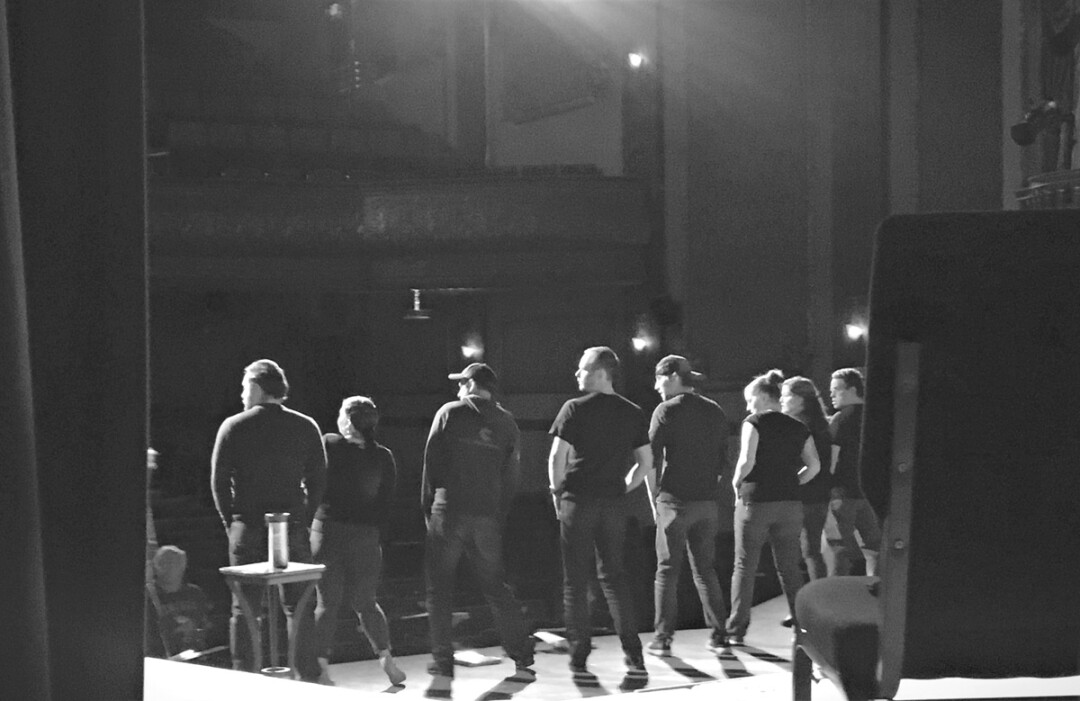Company: 1970s Musical at The Ellen
Kevin Brustuen | Monday Apr. 1st, 2019
The Golden Age of Broadway musicals began with the well-known musical Oklahoma! in 1943 and flourished with hits such as South Pacific, Camelot, My Fair Lady, and Singing in the Rain. The 1960s and 1970s were a revolutionary time in art, culture, and society convincingly illustrated with the opening of the musical Hair in 1968: rock-opera, musicals and book-musicals such as Tommy, Hair,and Jesus Christ Superstar threw open the door to new styles of music performance. These productions were inspired by the Vietnam war, experimentation with drugs, political assassinations, rebelling against authority, sexism and racism, and other prejudices. Using the form of rock operas and book musicals, artists were taking fresh looks at society, making statements and observations still relevant today. Against this backdrop, Company, a Stephan Sondheim book musical, was created and performed on Broadway in 1970, winning 6 Tony Awards. Montana TheatreWorks is bringing Company to the Bozeman stage at The Ellen Theatre April 12 - 21. 
Company is set in New York City in the 1970s, a time of hippies, love beads, peasant dresses, free love, and flower children— a time when people expressed who they were through the clothes they wore, the styles they chose, the songs they sang, as well as the protests and sit-ins in which they participated. Company takes a fun look at modern adult relationships, as it follows five married, previously married, or soon-to-be married couples and their mutual friend, Robert, a 35-year-old bachelor who has been unable to connect in a long-term relationship because he has observed less than ideal aspects of commitment in others. The show has hilarious dialogue, wonderfully funny scenes, and engaging songs, performed in a series of episodes, as Robert’s friends attempt to convince him that marriage is a good thing.
Book musicals such as Company are musical plays where songs and dances are fully integrated into a story with serious dramatic goals which can evoke genuine emotions besides just laughter. The three main components are music, lyrics and book. The book or script of a musical refers to the story, character development and dramatic structure, including the spoken dialogue and stage directions.Company is unusual in that it’s not based on a plot as much as it is a series of vignettes, organized around Bobby’s birthday. You may be familiar with some of Sondheim’s songs from Company, especially “You Could Drive a Person Crazy,” “Another Hundred People,” and “Side by Side.”
Montana TheatreWorks, the acting group bringing Company to the Ellen Theatre, was founded in 1995 by Mary Jo and John Ludin with a mission to bring high-quality community theater to live stages. John and Mary Jo moved their family to Bozeman in 1992, finding it a better place to raise a family than the Los Angeles area where he worked for Universal Studios. Shortly after arriving, he was asked to produce a performance of You Can’t Take It With You, followed by Arsenic and Old Lace for a community theater called Bozeman Stage Company. In 1995, Ludin decided to produce a musical, Damn Yankees, which was very well received with over 3,000 people attending, testifying to the desire for musicals in the Bozeman area. Damn Yankees is considered the first Montana TheatreWorks performance. The success of these shows led to the acquisition of The Ellen Theatre by Montana TheatreWorks. The restored Ellen opened to the public once again on December 4, 2008, with Christmas Carol. Since 2008, Montana TheatreWorks continues to produce several plays and musicals each year, with popular hits including Guys and Dolls, Oklahoma, Annie, Boeing Boeing, Fiddler on the Roof, A Christmas Carol, and White Christmas.
Audience members seldom think about the behind-the-scenes work that goes into mounting a stage production. There is far more going on behind the scenes than what the audience sees on stage: set design, costume design, choreography, and lighting and sound design are some of the pieces that are worked on even before rehearsals begin. Starting months before opening night of Company, director Joel Jahnke met with his design staff and explained his vision for the performance. Costume designer Claudia Boddy, Set Designer Tom Watson, Music Director Stefan Stern, and Choreographer Shari Watson had frequent discussions with Jahnke and each other to discuss their respective contributions and determine what needed to be accomplished to further the story that Jahnke envisions. 
As Boddy listens to Jahnke describe his vision for the characters of Company, she imagines what they are like; it’s not too difficult as she lived through that period of time and had many friends who fit the images of Jahnke’s description. Free-spirit “Marta” wore embroidered pants and shirts, leather vests and jackets, and possibly headbands. “Larry”, well-off, slightly older, fun-loving, might be wearing a purple velvet jacket. “Bobby,” the bachelor, the single guy who is the “Everyman,” has to look flashy-70s, but still sexy and lovable. Bell bottom pants and turtle neck sweaters and suede jackets come to mind. “I had a lot of friends in those days who wore clothes like these and did have the characteristics specific to Joel’s vision,” Boddy says. Once Jahnke and Boddy agreed on her costume designs, she started hunting for specific clothes that would meet these needs, in some cases ordering online from Etsy, in other cases adapting existing clothing pieces with needle and thread to meet the costume needs.
Boddy, a professional costume designer who worked in Chicago for many years before coming to Bozeman and working at Shakespeare in the Parks, talks about her work in putting together the appropriate costume design to help the audience see more clearly the concept that the play’s director is trying to convey. “When designing for Company in the Ellen stage, one has to be conscious of the large space and the set design; tiny patterns may wash out, but with more movement the patterns can still be ‘read’ by the audience, more so than with a solid color,” Boddy says. Clearly the 1970s are known for colorful and flamboyant designs in clothing and decorating; yet, if a character is wearing certain patterned clothes and sits on a couch with similar design or colors, the character could “disappear” into the furniture in the eyes of the audience.
With the extra movement that comes to the costumes through the dancing, colors and patterns can be more or less than what is desired or needed to make clothing patterns “pop” and become a seamless part of the scenes, so Boddy consults with the play’s choreographer, Shari Watson, to ensure that her costume designs work well with Watson’s choreographed dance steps to further communicate Jahnke’s concept for the play to the audience.
Telling the story through movement is always important, but especially so in musicals. As Boddy does with costumes, so Watson does with movement and dance. She listens to the music repeatedly until she knows it inside and out, keeping in mind the time period and the style, while at the same time remaining aware of the characters. As she listens to the music and starts feeling the rhythm, she remains conscious of Jahnke’s vision for the story, starting to play the songs in her head as sung by the characters and the actors who will play those characters. The dance tells the story along with the lyrics, costumes, and the set itself. The actors then inhabit a world that is created for them by the designers, breathing life into the inanimate sets, props, costumes, and dance steps, creating the laughter, loves, and memories that become the show you see on stage and are eager to rush home and tell others about.
The original production of Company opened at the Alvin Theatre in New York in April of 1970, with music and lyrics by Stephen Sondheim and the book by George Furth. Company will be performed at The Ellen Theatre by Montana TheatreWorks over two weekends. Opening performance is Friday April 12, continuing Saturday April 13, with a matinee on Sunday April 14. The last weekend performances are Friday April 19, Saturday April 20, with a Sunday matinee on April 21.
For more information or tickets, please go to https://www.theellentheatre.com/ or call the Ellen Theatre box Office at 406.585.5885. The Box Office is open at the Ellen Wednesdays through Saturdays, from 1 to 3 pm.
| Tweet |
